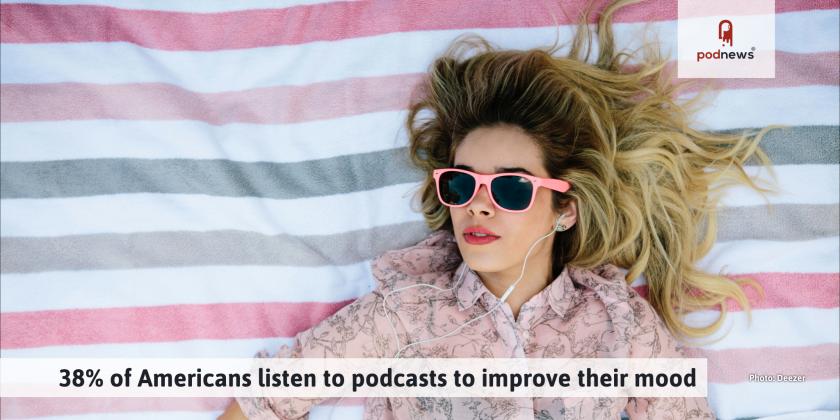
Americans turn to podcasts to deal with their feelings during the pandemic
This article is at least a year old
- Deezer study reveals people in the US are using podcasts to improve their mood, set a romantic ambiance and avoid loneliness while isolating
- During the lockdown period there was an increase in daily podcast listening, specifically relationship podcasts on Deezer
- Trauma expert and Survival Psychologist Dr. Sarita Robinson shares 6 tips to surviving self-isolation
Coral Gables FL, USA—The feelings of stress and loneliness posed by self-quarantine and the pandemic are natural. A quarter of Americans feel anxious since the coronavirus outbreak began. They are trying to deal with their feelings during the Covid-19 pandemic the best way they can. They seek comfort and are turning to other types of audio content to cope and create the best possible ambiance while home. These are some of the conclusions of a recent study commissioned by Deezer.
Deezer polled 11,000 users across eight countries1 on how they were using the global streaming platform. It wanted to understand how users were looking after their mental health while isolating and the role podcasts were playing in their lives. The answer is that 38% of respondents in the US listen to podcasts to improve their mood.
Content that focuses on relaxation, mindfulness and self-improvement helped 53% of American users get through the lockdown. Relationship podcasts have seen a dramatic 145% increase in daily active users worldwide since the start of March. Americans are specifically between the world listeners that tend to cozy up to romantic audio content the most on Deezer (with more than half of their responses confirming to be the case). In terms of listening, 67% of men stream more romantic content, compared to 41% of women. There was also an increase in daily podcast listening, people are listening twice as long compared to the beginning of March - up to 40 minutes from 20 minutes on average.
Gen Z and Millennials data reflects they are suffering the most, so they are searching for self-care and well-being content to be able to sleep, chill out, and make positive changes in their lives. Additionally, of all the age groups polled people aged between 35-44 (47%) are listening to podcasts more often.
Finally, people in the US are around three times as likely to use podcasts to combat loneliness, compared to some European countries.
“No one is immune to depression and loneliness. The good news is that audio content can provide some relief when we need it the most. That’s why we curate dedicated playlists and channels for our users. After all, we’re in this together,” concluded Alexander Holland, Deezer’s Chief Content Officer.
Regarding these results, Dr. Sarita Robinson, Principal Lecturer in the School of Psychology, University of Central Lancashire, said: “The rise in romantic audio content during isolation could be driven by increases in people’s oxytocin levels. During times of stress we are more likely to produce the love hormone oxytocin, and this in turn leads to more ‘tend-and-befriend’ behaviors.”2
“Audio content can help lift us up when we are feeling lonely. It is helpful as it breaks the silence which can become overwhelming. Podcasts act as a distraction and fill the time until we have the next phone call or video chat,” added the doctor.
The Covid-19 pandemic has led to months of lockdown, self-isolation and social distancing, causing a rise in mental health issues due to the difficulties of remaining resilient. Here are 5 tips to cope with the situation using audio content, according to the Survival Psychologist:
Stay connected Loneliness is one of the biggest challenges that people are facing during the pandemic. Americans are not only sharing audio content, but how are they feeling, drawing comfort from others, even when they are not physically present.
Feel positive vibes Listening to mood lifting audio content is recommended during difficult times as it helps us to feel happier by releasing endorphins, activating the pleasure and reward centers within the brain.
Find comfort in the past Surprisingly, nostalgia can help reduce anxiety by reminding us of comforting personal memories. People are turning to music from their teenage years during the pandemic. Music from our past causes the brain to release feel-good hormones.
Distract yourself The doctor recommends limiting your news intake and listening to content that’s more light-hearted, as hard-hitting news can make you feel overwhelmed. Release any stress you are holding by playing upbeat songs or positive podcasts that inspire.
Achieve personal growth Crisis can be a catalyst for change. If you are having a period of self-reflection, embrace it and download inspirational podcasts to support the chapter of the new you.
If you are taking preventative measures and staying at home, don’t hesitate to visit Deezer’s ‘At Home’ channel. There, you will find music, podcasts, audiobooks and radio stations to keep you entertained, healthy and relaxed.
…
1: Global research by OnePoll of 11,000 audio content streamers in eight markets (Brazil, France, Germany, Egypt, UAE, Saudi Arabia, US & UK) during April 2020.
2: The word 'tend’ refers to tending to your offspring and 'befriend’ refers to seeking out social support during times of stress https://www.betterhelp.com/advice/behavior/what-is-tend-and-befriend-and-why-is-it-so-important/
This is a press release which we link to from Podnews, our daily newsletter about podcasting and on-demand. We may make small edits for editorial reasons.